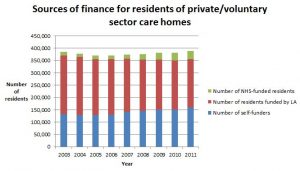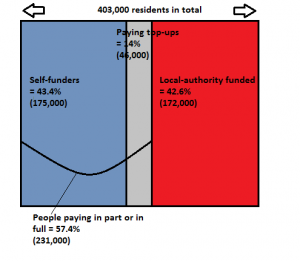How to Fund Care for People with Dementia UK
If you or a loved one has developed dementia, funding care becomes a concern. Unlike many other conditions, dementia isn’t fundamentally a disease that requires treatment. Instead, the person would need to be looked after and their daily needs handled until their last days.
Whether you’re getting full-time care in your house or a private care home, you may have to fund your entire dementia care yourself if you’re not eligible to receive the National Health Service (NHS) continuing healthcare funding. If you’re eligible, the NHS or local authority may fund a part of your care while you contribute towards any added cost due to the nature of care you require.
Who is eligible for the NHS continuing healthcare?

The Continuing Healthcare is “Care provided over an extended period of time, to a person aged 18 or over to meet physical or mental health needs that have arisen as a result of disability, accident or illness.”
However, there is usually confusion about whether someone with dementia would be eligible to receive the benefits. That’s because of the “health needs” clearly written in the definition. Dementia care is mostly categorized as primarily social rather than health (medical treatment), so some people with dementia may not qualify.
It is usually advisable to have both a medical assessment of dementia and a care assessment. These are two different things and may play a vital role in determining the scope and complexity of the care you need. Consequently, they may determine whether you’re eligible to get the NHS funding or not.
Furthermore, one criterion to be eligible for the NHS continuing healthcare is to have a total asset value not exceeding £23,250. Even when you’re in a private care home, the NHS may fund your dementia care through the local clinical commissioning group (CCG) provided you have below that threshold amount. They regard you as not having enough to cater to your financial needs.
But it’s also possible that your dementia gets complex such that you require more personalized care. This is most often the case, unfortunately. The social care will not fund the added cost of the extra care required, so you may have to foot that surcharge yourself. In that case, you’re only funding the top-up while the local authority funds the basic care.
On the other hand, people with dementia who have estates valued over £23,250 will have to pay out of pocket for their entire dementia care. This is called being a “self-funder“.
How to fund dementia care when you do not have the financial capacity and are ineligible for Continuing Healthcare
In reality, some people ma y not enjoy the benefit of NHS even when they own less than £23,250 in total estate value. That’s because there are several other criteria involved. Such persons with dementia may therefore have to foot the cost of their care themselves.
y not enjoy the benefit of NHS even when they own less than £23,250 in total estate value. That’s because there are several other criteria involved. Such persons with dementia may therefore have to foot the cost of their care themselves.
If you have a home, one way to fund your dementia care is to apply for a deferred payment scheme where the local authority pays for your dementia care, and then you repay when you sell your home or eventually pass away.
You would no longer stay in your property while in a care home, so it makes perfect sense to fund your care this way.
Other forms of financial support for dementia
Aside from the NHS, there are several other benefits the UK government offers to certain categories of people, of which those with dementia or their carer may qualify. We discuss some of them below.
Attendance Allowance
This is a government benefit to people over 65.
There are two weekly rates:
- £58.70 if you need help or supervision either in the day or at night
- £87.65 if you need help or supervision both in the day and at night, or if you’re terminally ill
Eligibility: you may be eligible if a mental condition or disability hampers your ability to care for your personal affairs.
Carer’s Allowance
This benefit is for someone who cares for another person that receives government benefits, such as the Attendance Allowance. It is £66.15 a week.
Eligibility—You must:
- Be at least 16 years of age
- Spend at least 35 hours weekly performing your care duties
- Earn no more than £123 weekly once allowable expenses are deducted
- Not be receiving certain other benefits.
Carer’s Credit
This is a UK government benefit paid to carers which helps build their entitlement to the basic State and Additional State Pension.
Eligibility: Income or estate value does not affect eligibility for Carer’s Credit. You only need to be caring for someone who receives certain benefits for at least 20 hours weekly, and you must be above 16 years of age.
Although you don’t receive the cash, you’ll get credits that help fill gaps in your National Insurance record.
Some tips to know when funding dementia care
- Your being at home or in a care home doesn’t affect who gets to pay. Where you get your care isn’t a criterion for Continuing Healthcare eligibility.
- If anyone in health or social care says you must pay for your care, ask them why that is. That conclusion can only be reached if NHS funding has been considered and you are found ineligible.
- You can and should appeal if you find the Continuing Healthcare funding denial to be unfair.
- You don’t have to complete any financial assessment forms, especially when you’ve been found ineligible for Continuing Healthcare. That’s because you’d have to self-fund in this case, so it’s of no use showing anyone your net worth.
- Remember that some people working in social care maybe rookies and therefore have inadequate knowledge about how these things work. So be sure to read the Care Act, so you know when you’re being misinformed.
Next steps
About two-thirds of people in the UK living with dementia receive care in their own homes. Having relatives around to care for you can help trim down costs.
However, dementia is a progressive condition, and soon, you may require more specialized care than your family can offer. It makes sense to live your final years in a care home that ensures you get the best quality of life that you can obtain at this time.
Even when you’re not eligible for NHS funding and aren’t financially strong, rest assured you can get several other benefits like the Attendance Allowance and carer’s allowance. In all, it’s all about ensuring your final years are more enjoyable and that your loved ones get to spend more quality time with you rather than worry about your basic needs round the clock.
If you or your relative’s dementia seems like you’d be safer and better cared for in a care home setting, we at English Oak Care Homes are here to receive you. We do not provide environments that we would not want our own parents to live in. We provide environments where people with dementia can feel safe, accepted, and as comfortable as they would be in their own homes.
Reach out to us today.




